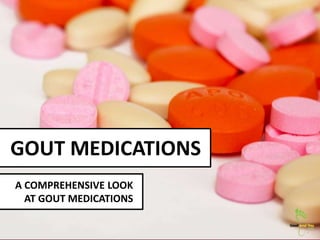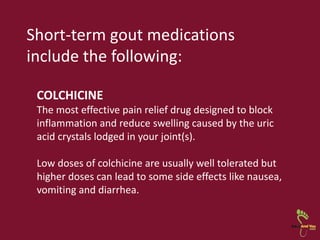Gout Medications
- 1. GOUT MEDICATIONS A COMPREHENSIVE LOOK AT GOUT MEDICATIONS
- 2. If you suffer from gout then there are two ways your doctor can treat your gout with medication. • First there the preventive gout medication, those that you take daily to keep uric acid levels normal. • Then there’s medication that help you during gout attacks, when you are most in pain, discomfort and wanting relief.
- 3. The medication your doctor recommends will be based on your present health status and your personal preferences. Most likely your doctor will combine a short term and long term option for ideal results. Gout medications are divided into either short-term or long-term.
- 4. SHORT TERM GOUT MEDICATION Short-term medication will treat your gout attack providing you with pain relief and reduced inflammation on the affected joint. At the same time it can prevent from another attack taking place.
- 5. Short-term gout medications include the following: COLCHICINE The most effective pain relief drug designed to block inflammation and reduce swelling caused by the uric acid crystals lodged in your joint(s). Low doses of colchicine are usually well tolerated but higher doses can lead to some side effects like nausea, vomiting and diarrhea.
- 6. NONSTEROIDAL ANTI-INFLAMMATORY DRUGS (NSAIDS) NSAIDs will reduce pain and swelling by blocking the enzymes and proteins involved in the inflammatory process. They’re available over the counter (Motrin, Advil and Aleve) at your local pharmacy. CORTICOSTEROIDS If you are unable to tolerate NSAIDs or colchicine then this is your final option. Corticosteroids will help reduce pain and swelling from inflammation providing almost immediate relief from gout symptoms. If you’re a diabetic, you may experience changes in your blood sugar levels when taking corticosteroids.
- 7. LONG-TERM GOUT MEDICATIONS They’re only prescribed after you’ve completed some blood work and it has been confirmed that you suffer from hyperuricemia and/or high uric acid levels. It should be noted to not take any of these medications while suffering from a gout attack. Taking any of these medications while suffering from a gout attack can worsen your condition.
- 8. Long-term gout medications include the following: ALLOPURINOL Typically considered the holy grail of gout drugs, allopurinol is a xanthine oxidase inhibitor which means that it inhibits the activity of xanthine oxidase, an enzyme involved when your body metabolizes purines thus reducing the production of uric acid. It can take up to six months to take effect in some patients. So you may experience some flare-ups during this period.
- 9. FEBUXOSTAT It functions the same way as allopurinol by decreasing uric acid levels in the blood. It is metabolized by the liver, so it’s considered safe for those suffering from kidney disease. PROBENECID It is mostly prescribed to gout sufferers whose kidneys don’t properly excrete uric acid so probenecid can help them increase excretion.
- 10. LESINURAD It’s often being used in combination with allopurinol to treat gout in those patients that can’t achieve their uric acid targets will only allopurinol. PEGLOTICASE It is a medication for about 3% of the gout population who are intolerant to all other gout medication options. It is administered via intravenous infusion every two weeks and is considered a last resort option. It goes by the brand name Krystexxa.
- 11. FIND OUT MORE LEARN MORE ABOUT GOUT MEDICATIONS CLICK HERE











